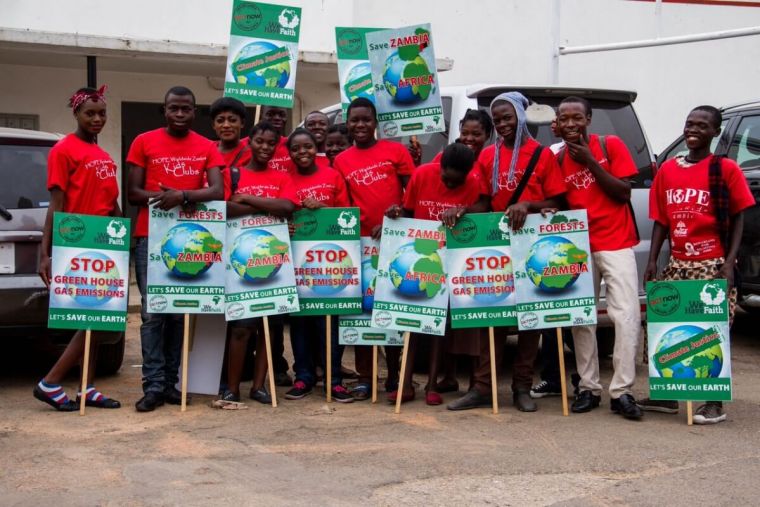Why world leaders must listen to climate activists from Africa
Over the last three months, scores of people from across the world have been travelling by foot, by bike and even by boat, over thousands of kilometres, to raise awareness of the climate challenge our world is facing in the run-up to the United Nations climate change summit.
From Mozambique in the south, to Norway in the north, these pilgrimages have been moving towards France. This weekend sees the climax of their journey, when the travellers will meet in Paris to fly the flag for climate justice as world leaders prepare for the UN conference, which starts on Monday.
African campaigners have played a key part in this unique journey: I have had the privilege of participating in and witnessing their incredible efforts firsthand, through my role as a 'Climate Ambassador' for the ACT Alliance, a coalition of 137 church based organisations working to bring sustainable change to poor and marginalised communities in 100 countries.

Earlier this year, ACT Alliance worked with three other agencies – We Have Faith, the Pan African Climate Justice Alliance and Oxfam in Africa – to launch the 'Pan African Cycling Caravan for Climate Justice'. This joint initiative saw cyclists setting off from Maputo in Mozambique, on August 29, to embark on a 6,500km two-wheeled journey to raise the voices of people on the front-line of our changing climate.
This was the first ever long-distance caravan on bicycles in Africa, led by people from faith communities and civil society organisations.
In the last 12 weeks or so, the caravan has travelled from Mozambique to South Africa, Botswana, Zimbabwe and my home country of Zambia, before moving on through Malawi, Uganda, Tanzania and finally to Kenya, where it arrived a fortnight ago.
Along the way, the cyclists and activists have collected thousands of signatures demanding action on climate change: one of the most critical and challenging issues of our generation.
Signatures have also been collected as far afield as the United States as well as in the United Kingdom, where 'climate pilgrims' have been mobilised by groups such as Christian Aid (an ACT Alliance member), Tearfund, CAFOD and the Church of England.
All these signatures – expected to number hundreds of thousands – will be part of an international petition to be delivered to representatives of the United Nations Framework Convention on Climate Change (UNFCCC) and the French government this Saturday, 28 November.
This climate pilgrimage has had two main objectives: firstly, to encourage people to reflect on the state of the world and our own role in the environment God has created, and secondly, to take action by demanding for a just, equitable and ambitious climate agreement in Paris.
Pilgrimage has deep tradition within Christianity. It is an opportunity for reflection and meditation, but also an opportunity to get close to the creation God asked us to take care of. It is therefore no surprise that climate pilgrimage is an important element of the global Church's preparation for the UN summit.
As a church minister, I am delighted Christians have been at the forefront of this movement. Climate change is already a reality for millions of poor and vulnerable people, and one that faith communities cannot ignore.
Today, it is the poorest and most vulnerable people in the world's developing countries who are on the frontline when droughts, floods and erratic weather patterns hit: people in nations such as mine that have contributed only marginally to global warming, yet who bear the brunt of its devastating impact.
We cannot just stand by and watch what is happening: there is a need for action.
On Monday, political leaders from all over the world will begin the task of drawing up a global climate agreement in Paris. This agreement needs to rein in global warming while boosting a green transformation that can help us to achieves sustainable and resilient development for all – particularly poorer nations who so desperately need financial support in order to pursue clean development.
Until now, climate talks have focused a lot on who should do what, and few countries accept their real responsibility. But in reality, we all have to do what we can, instead of thinking of how we can do as little as possible.
Yes, climate action may have a cost: but if there is no action, vulnerable communities will be left to pay the highest price. People are seeing their crops fail, are going hungry and are facing the very real risk of having to leave their homes and escape from everything they know and hold dear.
That's why I sincerely hope that world leaders listen to the call from those who have walked, cycled or sailed in a bid to raise global awareness of climate change and the need for action.
The pilgrims' message is very loud and clear – action tomorrow may be too late. COP21 will be a real test of the leaders' will to rise to the occasion and to save the world from disaster. The time to act is now.
Revd Suzanne Matale is the General Secretary of the Council of Churches in Zambia.











